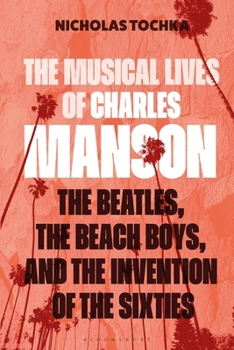The Musical Lives of Charles Manson: The Beatles, the Beach Boys, and the Invention of the Sixties --Or, No Sense Makes Sense
Nicholas Tochka analyzes the role of rock music in the life of Charles Manson, the Family, and the August 1969 Tate-LaBianca killings, which also gives larger insight into Sixties counterculture.
Failed singer-songwriter. Devious cult leader. A rock Pied Piper. The product of a sick society. Just another dime-a-dozen singing hippy mystic. Did the guitar-playing guru personify the violence that the rock counterculture inflicted on America? Or did his music diagnose the dehumanizing effects of that society's broken institutions? For over five decades, commentators have debated the meaning of Charles Manson and the Tate-LaBianca killings. Rock music links their narratives: from the aciddrenched singalongs at the Spahn Movie Ranch, to a bizarre theology centered on Beatles songs, to his commune's alleged links with Hollywood's elite, to an album, LIE: The Love and Terror Cult (1970). In this first comprehensive examination of the Manson Family's music, Nicholas Tochka writes with, against, and alongside the many authors-true-crime hacks, gonzo journalists, conspiracy theorists, and rock critics alike-who have told and retold the story of "the Manson murders." Playing the truth games that these postwar Americans helped invent, The Musical Lives of Charles Manson presents a new take on the story of the commune-and on rock's role in fracturing the possibility of writing trustworthy histories after the Sixties. "They are afraid of it, because it tells the truth," Manson once claimed, describing his music. Just what truths did the Manson Family's music-making tell?Format:Hardcover
Language:English
ISBN:1501384562
ISBN13:9781501384561
Release Date:January 2026
Publisher:Bloomsbury Academic
Length:288 Pages
Weight:1.22 lbs.
Dimensions:0.7" x 6.0" x 9.0"
Customer Reviews
0 rating





